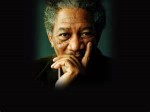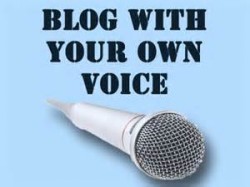If you were a singer, you would be doing deep breathing exercises and running scales – do,re,mi…
 If you were an actor or speaker, you would be doing the exercises and practicing vowels – a, e, i…
If you were an actor or speaker, you would be doing the exercises and practicing vowels – a, e, i…
…and you’d both be checking things like projection, volume, and resonance.
But as a writer, voice may be a bit more difficult. In this case, voice has nothing to do with sound. So how do you stand out? Can your readers tell you apart from other writers as easily as they would distinguish James Earl Jones from John Wayne? Barbara Streisand from Katie Perry?
We develop our voices by use of speech pattern, phrases, vocabulary, and the way we build our sentences. We use personalities. You can’t hear my southern accent, so I try to use informal phrases that are common in the south. Y’all. Fixin’ to. Gonna . I want to invite you into the conversation. Other writers prefer to distance themselves from the reader…as if the librarian was reading. None of these are wrong. There are as many voices as there are writers, and they all work.
Don’t you have favorite authors? Writers whose works you immediately engage in? Many writers use the same voice in almost all of their books, and their readers look forward to it. One of my favorites is Sue Grafton…every time I open one of her Alphabet Mysteries I feel like I’m stepping into an old friend’s house.
Okay. There is an advantage to developing a familiar voice and staying with it…but also a disadvantage. It can keep you from growing. You become used to your own type of story, your own way of telling things, so when a new idea springs to mind you want to tell it like all the others, but sometimes it just doesn’t want to be told that way.
Voices are funny that way. So think of it like this - when you were little, did you ever listen to your Mom or Dad talk to a salesman? Or to their friends? Who were those people?
Ours should be that way, too. We should develop different voices….remember, none of them are really us in the first place. They are the voice of THE STORYTELLER. As you develop a story, think about how you want your reader to ‘hear’ it. This will lead you to the right voice.
Sure, if we are writing a series we should be consistent. Continuity and all that. But, well, if Sue Grafton decided to write a gothic romance, it just wouldn’t be right to find Kinsey Millhone in that setting (note to Sue…find a different voice for that new heroine! Maybe one all fluttery and breathless.)
The only exception might be things like this blog…where I let myself go and write without thinking about voice or style or anything like that. It’s just me sharing stuff. Really.
But it’s only conversation. And we are friends…aren’t we?
Here’s a simple exercise:
- Identify the voice of your favorite author.
- Pull out a particular paragraph, description, or piece of dialogue that he/she wrote.
- Re-write it. What would you change if it were yours? How would you tell your reader that part?
That’s YOUR voice coming out! At least, it’s one of them.
Some writers say voice and style are the same thing, and I’ll admit they can make a case for it, but I feel they are two distinctive things. Hmmm….so the next blog should be – Style?






Great post. And yes, it would be a good writing exercise.
Sounds like a great exercise!